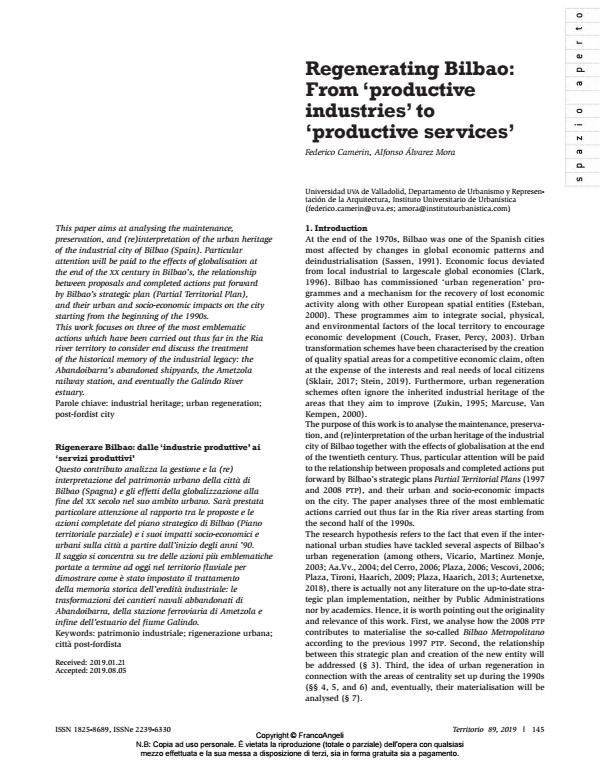Regenerating Bilbao: From "productive industries" to "productive services"
Titolo Rivista TERRITORIO
Autori/Curatori Federico Camerin, Alfonso Álvarez Mora
Anno di pubblicazione 2019 Fascicolo 2019/89
Lingua Inglese Numero pagine 10 P. 145-154 Dimensione file 3558 KB
DOI 10.3280/TR2019-089019
Il DOI è il codice a barre della proprietà intellettuale: per saperne di più
clicca qui
Qui sotto puoi vedere in anteprima la prima pagina di questo articolo.
Se questo articolo ti interessa, lo puoi acquistare (e scaricare in formato pdf) seguendo le facili indicazioni per acquistare il download credit. Acquista Download Credits per scaricare questo Articolo in formato PDF

FrancoAngeli è membro della Publishers International Linking Association, Inc (PILA), associazione indipendente e non profit per facilitare (attraverso i servizi tecnologici implementati da CrossRef.org) l’accesso degli studiosi ai contenuti digitali nelle pubblicazioni professionali e scientifiche.
This paper aims at analysing the maintenance, preservation, and (re)interpretation of the urban heritage of the industrial city of Bilbao (Spain). Particular attention will be paid to the effects of globalisation at the end of the xx century in Bilbao’s, the relationship between proposals and completed actions put forward by Bilbao’s strategic plan (Partial Territorial Plan), and their urban and socio-economic impacts on the city starting from the beginning of the 1990s. This work focuses on three of the most emblematic actions which have been carried out thus far in the Ria river territory to consider end discuss the treatment of the historical memory of the industrial legacy: the Abandoibarra’s abandoned shipyards, the Ametzola railway station, and eventually the Galindo River estuary.
Questo contributo analizza la gestione e la (re) interpretazione del patrimonio urbano della città di Bilbao (Spagna) e gli effetti della globalizzazione alla fine del xx secolo nel suo ambito urbano. Sarà prestata particolare attenzione al rapporto tra le proposte e le azioni completate del piano strategico di Bilbao (Piano territoriale parziale) e i suoi impatti socio-economici e urbani sulla città a partire dall’inizio degli anni ’90. Il saggio si concentra su tre delle azioni più emblematiche portate a termine ad oggi nel territorio fluviale per dimostrare come è stato impostato il trattamento della memoria storica dell’eredità industriale: le trasformazioni dei cantieri navali abbandonati di Abandoibarra, della stazione ferroviaria di Ametzola e infine dell’estuario del fiume Galindo.
Parole chiave:Patrimonio industriale; rigenerazione urbana; città post-fordista
- Trends in Social Acceptance of Renewable Energy Across Europe—A Literature Review Marco Segreto, Lucas Principe, Alexandra Desormeaux, Marco Torre, Laura Tomassetti, Patrizio Tratzi, Valerio Paolini, Francesco Petracchini, in International Journal of Environmental Research and Public Health /2020 pp.9161
DOI: 10.3390/ijerph17249161 - Spatial Responses of Ecosystem Service Value during the Development of Urban Agglomerations Huisheng Yu, Jun Yang, Dongqi Sun, Tong Li, Yanjun Liu, in Land /2022 pp.165
DOI: 10.3390/land11020165 - Integrating support groups, an effective approach to regenerate historic neighborhoods of Iran Case study: Oudlajan Neighborhood, Tehran Mohaddese Ghadiri, Mozaffar Sarrafi, in Land Use Policy 105820/2022 pp.105820
DOI: 10.1016/j.landusepol.2021.105820 - Maladaptive Planning and the Pro-Innovation Bias: Considering the Case of Automated Vehicles António Ferreira, Kim von Schönfeld, Wendy Tan, Enrica Papa, in Urban Science /2020 pp.41
DOI: 10.3390/urbansci4030041 - From Public Housing to Private Housing: Neglect of Urban Qualities during the Urban Regeneration Process Hadas Shadar, Dalit Shach-Pinsly, in Land /2022 pp.875
DOI: 10.3390/land11060875 - Book review: Transnational Architecture and Urbanism: Rethinking How Contemporary Cities Plan, Transform and Learn Federico Camerin, in Urban Studies /2022 pp.3024
DOI: 10.1177/00420980221107860 - Hacia una conceptualización de Gran Propiedad y su papel como referente en el proceso de producción de la ciudad = Towards the conceptualization of the Great Property and its role as a reference point for the city-making process Federico Camerín, in Cuadernos de Investigación Urbanística /2022 pp.1
DOI: 10.20868/ciur.2022.140.4816 - Post-Fordist Production and Urban Industrial Land Use Patterns Frank Roost, Elisabeth Jeckel, in Urban Planning /2021 pp.321
DOI: 10.17645/up.v6i3.4272
Federico Camerin, Alfonso Álvarez Mora, Regenerating Bilbao: From "productive industries" to "productive services" in "TERRITORIO" 89/2019, pp 145-154, DOI: 10.3280/TR2019-089019